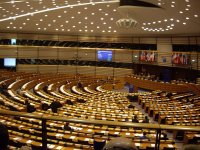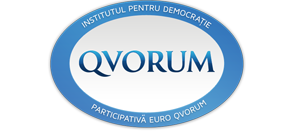
The study, which combines qualitative and quantitative analysis of the activities (reports, votes, declarations etc.) with field research at Brussels, is structured in two parts: a comparison of the Romanian delegation in relation to delegations from other states members of EU and individual analysis of the activity of each one of the romanian eurodeputies. The full material can be downloaded from here: https://qvorum.ro/publication/.
The main conclusions of the study:
• The activity of the romanian eurodeputies in the current legislature is (still) not satisfying. Romanian delegation didn’t manage to take advantage of the fact that Romania occupies the 7th potential influence, this potential being calculated having in consideration the number of deputies and the positions they held.
• The attendance of the Romanian delegation on the plenary sessions of EU is still really low in comparison with other member states, even though an increasing trend may be observed. Thereby, the delegation of our country finished the first year of mandate on 26th position (last but one), with an average attendance of 85,84%, and on the first trimester of the 2nd year of mandate, is standing on the 24th position with an average of 86,71%.
• Individual attendance of most of the deputies is slightly increasing, especially after the moment when their activity was publicized by the mass-media from the country. Thereby, an example on this line is Traian Ungureanu (EPP), who had an attendance of 74.14% in the first year of mandate, and in the first part of the 2nd year of mandate he has an attendance of 100%, therefore registering a growth of approximately 25%. In a similar situation we can find Viorica Dăncilă (+15%), Renate Weber (+16%) and also Adina Vălean, Cristian Buşoi, Norica Nicolai and Sebastian Bodu (+10%). However, we found European deputies who’s attendance on plenary sessions show a decrease: Ioan Mircea Paşcu (-43%), Аdrian Severin (-10%), Claudiu Ciprian Tănăsescu (-16%), Rareş Niculescu (-16%) and Corneliu Vadim Tudor (-8%).
• Overall, members of Romanian delegation own leading positions on activities where they don’t necessarily need political support from their political group colleagues or Parliament. Thereby, on speeches Romania found itself on 4th position (9th place on the previous mandate), regarding questions, Romania is placed on 14th place (18th place on the previous mandate), regarding amendments on 6th place (4th place on the previous mandate) and on motions for resolutions on 5th place (20th place on the previous mandate).
• In terms of important activities, even though a slight improvement may be observer, the romanian eurodeputies are placed on the 2nd part of the ranking. Thereby, regarding reports allocation, delegation of our country is placed on 15th place (20th place in the previous mandate) and on the opinions allocation is placed on 11th position (15th place in the previous mandate).
Doru Franţescu, the director of EIPD-Qvorum, explained that “the field research has shown that an important factor of the slight increasing of the eurodeputies attendance and activity in the recent months is triggered by showing through mass-media the activity they perform at Brussels and Strasbourg. The fact that we escaped from having the label of absence champions doesn’t help that much if the eurodeputies don’t start working seriously: for the moment we are champions on speaking, but we’re the last when it comes to actions.”
• Thereby, only few of the romanian deputies did good on the latter aspects, obtaining the position of rapporteurs on truly important topics and proving a real influence in EP:
European Railway network for a competitive freight transportation (Marian Jean Marinescu, PDL/EPP)
Council regulation concerning the notification to the Commission of investment projects in energy infrastructure within the European Community (Adina Vălean, PNL/АLDE)
Recognition of agriculture as a strategic sector in the context of food security (Daciana Sârbu, PSD/S&D)
Directive of maternal leave (opinion, Rovana Plumb, PSD/S&D)
European Parliament and Council Directive regarding energy performance of the buildings (Adriana Ţicău, PSD/S&D)
EU strategy for the Black Sea – (founder: Traian Ungureanu, PDL/EPP)
• Shadow: Adina Vălean (ALDE/PNL)
• Shadow: Sabin Cutaş (PSD/S&D)
Funding Non-governmental organizations from community sources (opinion, Monica Macovei, PDL/EPP)
Partnership and cooperation agreement between European communities and Turkmenistan (Norica Nicolai, PNL/ALDE)
The progress of Iceland in the process of adhering on EU (Cristian Preda, PDL/EPP)
Other observations:
• Romanian MEPs, alike their colleagues from the other member states, are voting on the line of the political group from which they belong (popular, socialist or liberal) and they don’t group according to the nationality
• Manipulation tendencies: there are many situations when, taking advantage of people’s lack of information within the country, some eurodeputies are exaggerating the importance of their actions in EP.
Doru Franţescu, director of EIPD-Qvorum, shown which are the most frequent ways used to manipulate:
O “The MEPs are sending information in which they say they were rapporteurs on some proposals, when in fact they were only virtual rapporteurs or opinion rapporteurs (see the terminology at the beginning of this study).
O MEPs are spamming mass media with information regarding the statements they do in EP. Actually, the speeches represent a viable instrument only when they are accompanied by precise actions (writing reports, opinions, amendments), otherwise they have just a propagandistic character and they are counter-indicated.”
Recommendations:
In our opinion, in order to defend the interests of the voters and social partners from Romania by the elected representatives in EP, the following aspects are needed:
• The MEPs should take a higher responsibility having the role of representatives by:
O Identifying methods to raise their influence in EP;
O having a much better communication and transparency regarding their activities, starting from the premise that they are in Brussels and Strasbourg not on their own, but to represent the people who chose them to be there;
• Social partners from Romania should inform themselves more in which concerns the legislation from EP agenda, because approximately 70% of the current legislation from Romania is adopted by this authority. Before entering in an advised dialogue with the eurodeputies, the social partners need to be well informed regarding the legislative proposals which will affect their activity;
• Mass Media from the country should continue to publicize the activity of the MEPs, in the same time, trying to specialize their journalists in the field of European decisional process, having in consideration the gradual growth of the importance of European institutes in relation to the national ones and the direct consequences which result from this change and influences the daily life of the citizens.
The present study is part of the program “MEPs on Report” which was launched by European Institute of Participative Democracy on March 2009 and which will present a series of monitoring reports during the whole legislature 2009-2014. More so, Qvorum Institute is performing a constant monitoring of the activities and votes from EP and releases informative newsletters after each plenary session (monthly).
For additional information please contact:
Doru Franţescu, Director, EIPD Qvorum, doru.frantescu@qvorum.ro, 0722 145 790 or
Rucsandra Filloreanu, Project Manager, rucsandra.filloreanu@qvorum.ro, 0721 554 044
